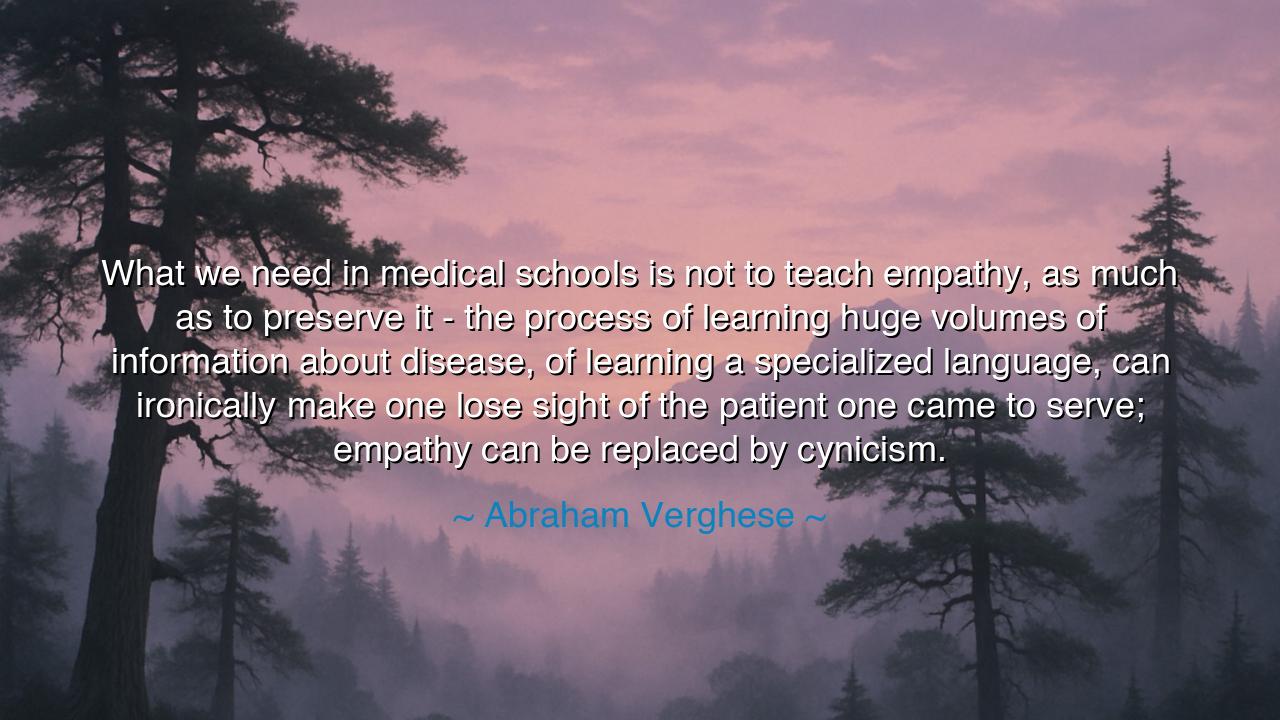
What we need in medical schools is not to teach empathy, as much
What we need in medical schools is not to teach empathy, as much as to preserve it - the process of learning huge volumes of information about disease, of learning a specialized language, can ironically make one lose sight of the patient one came to serve; empathy can be replaced by cynicism.






In the poignant words of Abraham Verghese, “What we need in medical schools is not to teach empathy, as much as to preserve it — the process of learning huge volumes of information about disease, of learning a specialized language, can ironically make one lose sight of the patient one came to serve; empathy can be replaced by cynicism.” we are confronted with a truth both powerful and unsettling: that in the pursuit of knowledge, we may sometimes lose sight of humanity. Verghese, a physician and writer, speaks not of a flaw in medical education but of a deeper, more insidious challenge—the potential for compassion to be suffocated under the weight of facts, technical terms, and the cold precision of modern medical practice. His words are a warning from the frontlines of healing, a call to remind us that medicine must heal the soul as much as the body.
The origin of this quote arises from the modern tension between clinical knowledge and patient-centered care. As medical science has advanced, so too has the volume of information that medical professionals must master—diseases, treatments, technologies, and languages that are often as difficult to learn as they are essential to practice. Verghese, however, points out the unintended consequence of this specialized training: the very tools we use to heal may distance us from the patients we are sworn to serve. The language of medicine, once a bridge to understanding, can become a wall that separates the healer from the one who is suffering. The deeper a physician goes into the realm of science, the more they may forget that medicine is not just a study of disease, but a service to life—to the person who is experiencing it.
In the ancient world, healers were seen not only as skilled practitioners, but as servants of the soul. Hippocrates, often considered the father of medicine, understood that a physician’s work was not just about curing ailments but about tending to the whole person, mind and spirit. He did not merely prescribe remedies but also listened to his patients’ stories, acknowledging their fears, hopes, and sufferings. In the Hippocratic Oath, which physicians still take today, there is a solemn vow to treat the patient with compassion, understanding, and humility. In this light, Verghese’s concern is not new; it is a recurring challenge in medicine, one that transcends the ages: how do we balance expertise with empathy, how do we ensure that a doctor’s technical skill does not drown out their capacity for human connection?
Consider the story of Florence Nightingale, a woman whose name is synonymous with nursing and compassionate care. Nightingale, during the Crimean War, was not only concerned with the physical well-being of soldiers but also with their mental and emotional health. She understood that healing was more than bandages and medicine; it was about the human connection, about offering dignity to those in pain. In a time when the medical profession was predominantly focused on treating symptoms, she introduced the idea that care must involve personal engagement. She was able to combine the science of medicine with the art of empathy, ensuring that the soldiers were not just patients but people whose suffering deserved to be acknowledged. Her legacy is proof that the human spirit can guide even the most technical professions, and that medicine is as much a calling to the heart as it is to the mind.
Verghese’s words are a stark reminder of the danger of specialization when it disconnects us from the very reason we pursue these professions: to help others. In the modern era, this has become an ever-present challenge, especially in urban hospitals where the pace is rapid, the caseload high, and the moments for reflection scarce. A physician may know all the facts about a disease but fail to see the person standing before them. It is here that the loss of empathy can creep in—when a patient is no longer seen as a human being but as a case to be solved. The scientific knowledge that once served as a guide becomes the thing that drives us further from the people we are meant to heal.
The lesson, then, is one that applies not only to the medical profession but to all professions where expertise may come at the cost of humanity. We must strive to keep our hearts open, even as we gather knowledge, to remember that knowledge must serve compassion, not replace it. Verghese’s plea is a call for balance: yes, we must be experts in our fields, but we must never forget that the person is always more important than the disease. The path of a healer is not only about curing but about understanding, listening, and empathizing with those we serve.
In our own lives, we can all heed this wisdom. Whether we are teachers, doctors, or leaders in our communities, we must tend to the souls of those we serve, remembering that wisdom without compassion leads to cynicism. The challenge is to remain human in the face of professional demands, to remember that behind every problem, every equation, and every task is a person—someone whose life is sacred, whose pain deserves our attention, and whose heart deserves our respect. Let us live with the balance of knowledge and empathy, so that we can both understand the world and heal it.






AAdministratorAdministrator
Welcome, honored guests. Please leave a comment, we will respond soon